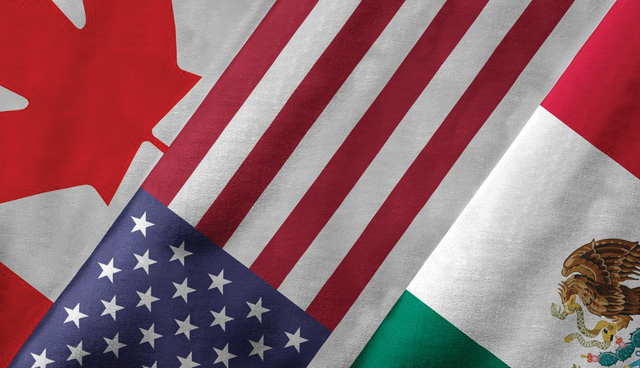The US-Canada-Mexico Agreement: a Brexit precedent?


After a lengthy period of fraught negotiations between Ottawa and Washington, top negotiators have announced an agreement which will see Canada join the US and Mexico in a new trade deal. agendaNi assesses the details of the new deal and its implications for the ongoing Brexit negotiations.
September’s end saw the announcement of the US-Mexico-Canada Agreement (USMCA) after months of negotiations in a bid to replace the North American Free Trade Agreement (NAFTA), which was signed by the US, Mexico and Canada in 1994. However, President Donald Trump has rejected claims that the USMCA is a roll-on from previous deals, claiming that the fresh agreement isn’t “NAFTA re-done, it’s a brand new deal”.
Elements of the pact include some adjustments to some of the USA’s key trading relationships, including a revised set of regulations for vehicle manufacturing, in a move designed to encourage the building of automobiles in higher-wage countries.
The American dairy industry has benefited greatly from the deal, with farmers now able to sell cheese, milk and other dairy products to Canada with reduced barriers. Notably, the new deal retains a tribunal process for unresolved disputes, in an aspect of the deal originally opposed by the Trump administration. Canadian and Mexican representatives have welcomed the deal for its exemption of automobile tariffs, which were repeatedly used as a threat by Trump in the event of a ‘no-deal’.
A revealing aspect of this development is in the name: USMCA. NAFTA was repeatedly attacked as “the worst trade deal ever” throughout Trump’s election campaign, and the fact that the new deal represents mainly cosmetic changes has been negated by a choice of name which ‘puts America first’. The significance of the choice of abbreviation mirrors some of the dialogue currently surrounding Brexit, with the mantras of ‘taking back control’ and ‘what’s best for Britain’ forming key elements of the British Government’s attitude towards negotiations with the European Union. Concessions granted to the Canadian Government have contrasted with Donald Trump’s protectionist approach to international trade. Indeed, such concessions may have to be made by Theresa May and Michel Barnier to avoid a ‘no-deal’ scenario.
Further similarities to Brexit negotiations can be seen in how the deal’s enactment hangs in the balance, with its dependency on approval from the next Congress. Whilst recent polls suggest a future Democrat majority in the House of Representatives, Trump himself has suggested that opponents could vote down the trade deal and ultimately compromise the stability of the USMCA on Capitol Hill. Like Trump, Theresa May faces the possibility of defeat in the upper house.
Trump has responded to suggestions of a Democrat halt to the Agreement with claims of “lots of other alternatives”, which have yet to be substantiated with greater detail. It seems that this is an apparent mirroring of the approach taken by the fractured Conservative Party, which remains torn on Theresa May’s Chequers proposals. Indeed, the fracturing of the Conservative Party remains the biggest challenge to its standing in ongoing negotiations, with hardline Brexiteers such as Boris Johnson and Jacob Rees-Mogg openly criticising Cabinet proposals.
Cross-border supply chains were consistently highlighted as integral to the success of any bilateral trade deal. Questions of cross-border trade have presented a major sticking point in the ongoing Brexit negotiations, with May and her governmental partners in the DUP refusing to see any special status given to Northern Ireland and its border. However, the Prime Minister may have to offer a significant concession on the Irish border which would keep Northern Ireland tied to European customs rules on goods after the transition period ends.
Beyond the details of the USMCA, international observers have welcomed the Agreement after a long period of uncertainty which saw aggressive exchanges between states, threats of tariffs and even refusals to meet fellow leaders one-on-one. Further afield in Europe and the United Kingdom, solace may be taken from the last-minute Agreement as the feared prospect of a ‘no-deal’ Brexit continues to grow.





